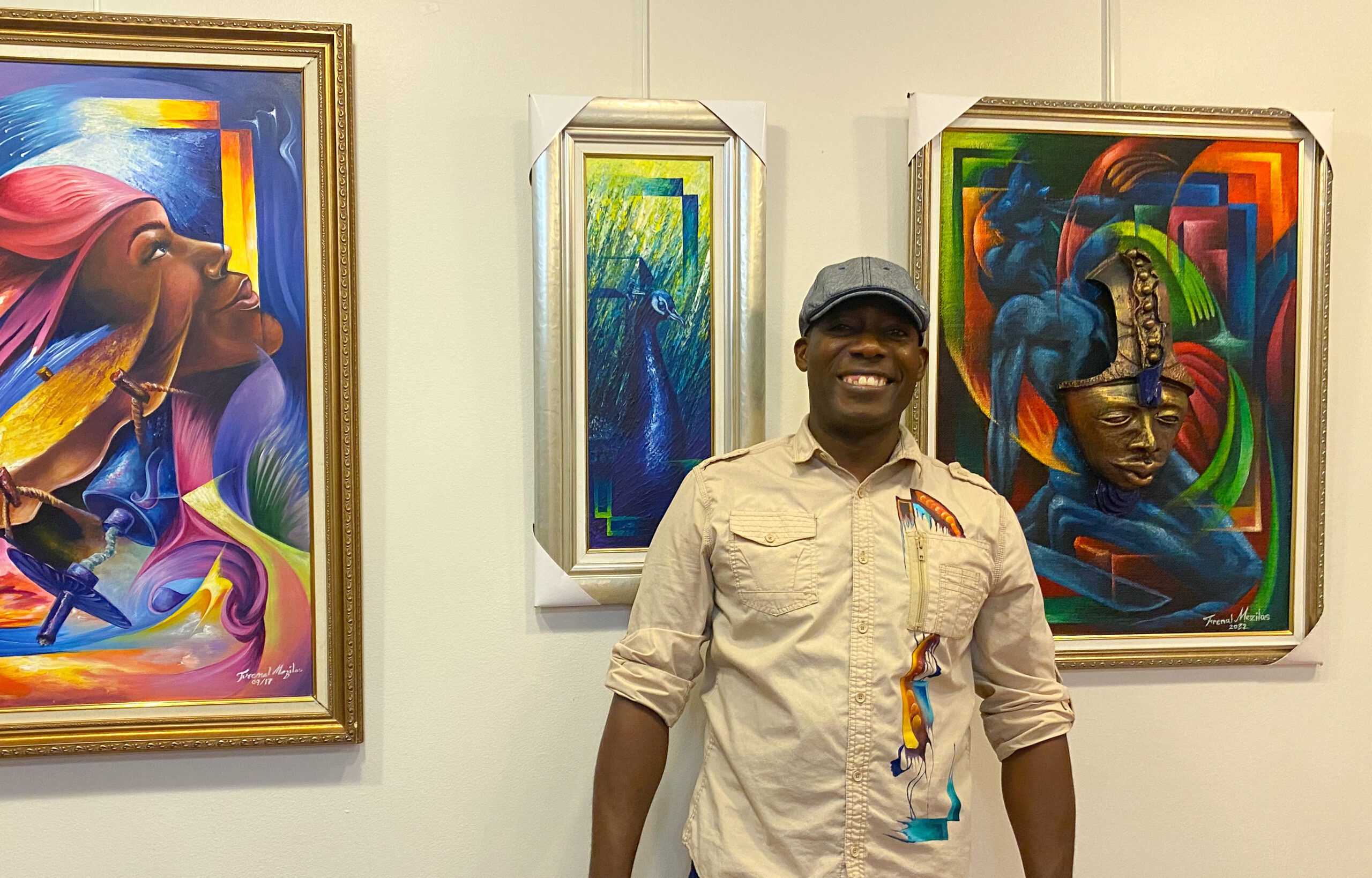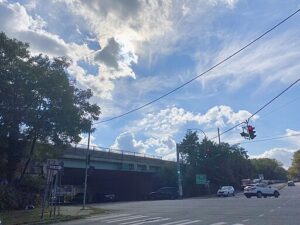By Taylor Nicioli
Editor’s note: This is part one in a long-term series on Uniondale by Hofstra University graduate journalism students enrolled in Community Journalism this past fall.
Capturing the essence of an entire culture in one work of art would be notably difficult, and arguably impossible, but that doesn’t stop local artist Frenal Mezilas from trying.
Born in Haiti and now a resident of Uniondale for 10 years, Mezilas shares his artwork with the community in hopes of educating people about what his culture is really like back at home. His acrylic paintings, which sing with vibrant colors and happy faces, reflect those of Haitian backgrounds and identities, and they are proving to be of importance to members of the Uniondale community.
“I know how Haiti is because I grew up in Haiti, but so many Haitians in this town, they have kids that don’t even know what Haiti looks like,” Mezilas said. “I wanted to do something where everyone who looks at this painting can see how Haiti looks, and they will feel something.”
Mounted high near the Uniondale Public Library’s entrance is one of Mezilas’ most recent works — a collage comprising people, musical instruments, buildings and more, titled the “Haitian Resilience Project.”
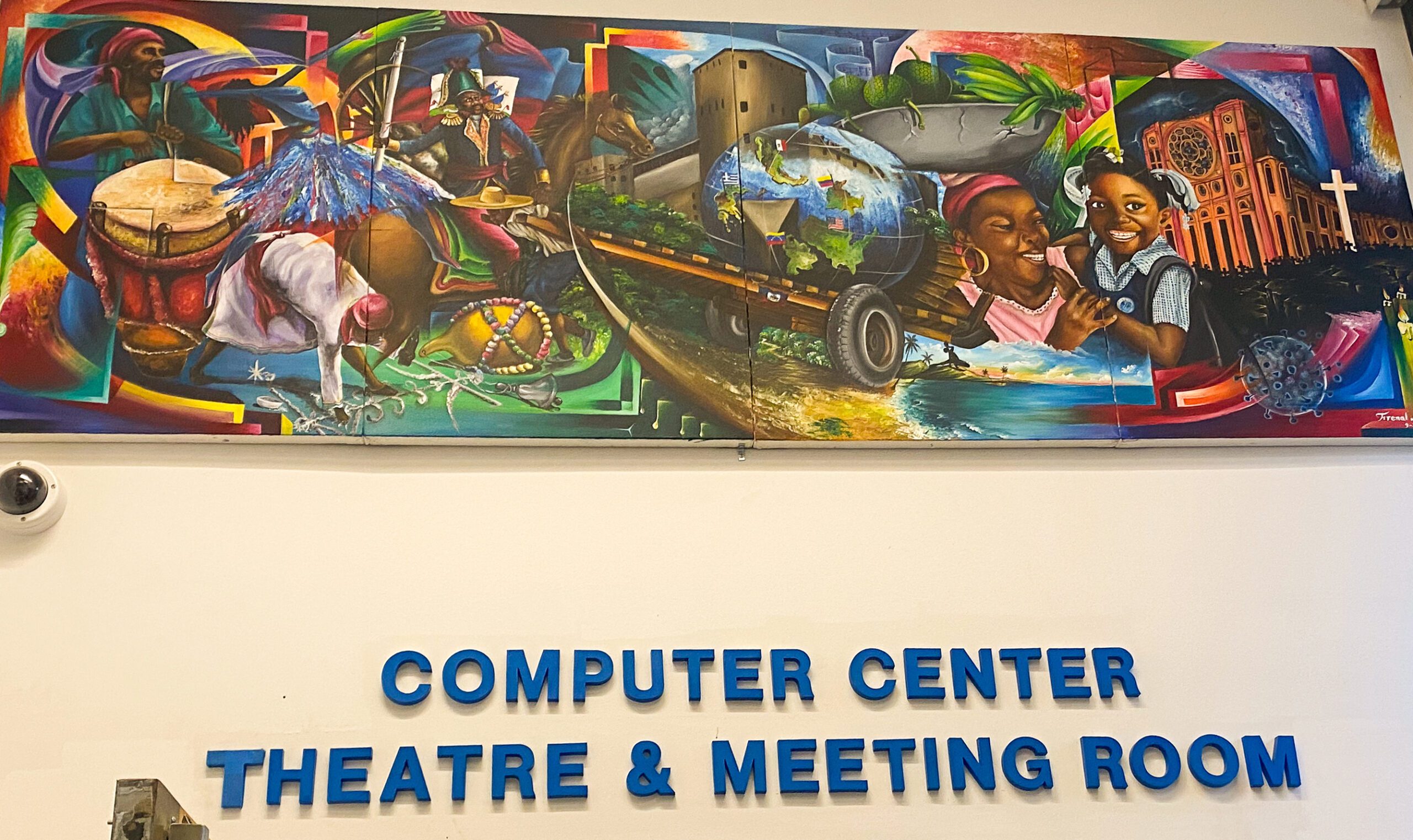
The painting is in collaboration with several organizations, including the Huntington Arts Council and the Wallace Foundation via the Uniondale School District. With this new addition, the library wanted a piece of art displayed that encapsulates the culture of many of those living within the community.
According to the 2020 census, over 21% of Uniondale residents were born outside the United States, and nearly 93% of them were from Latin America. Uniondale has a strong Haitian presence, and this spreads to the foundation of the community, with many local restaurants that serve Haitian food, artists who share their artwork around town, dancers who teach traditional moves and more.
“In the New York area, and in Uniondale, I think a lot of people move here, so there is a big Haitian community,” said Ilgar Guo, the library’s programming director. “Our clients, our customers, a lot of them are from Haiti. It’s good to promote their culture so that people have an opportunity to see the art or the food, and they will learn even more about Haitian culture.”
“I know how Haiti is because I grew up in Haiti, but so many Haitians in this town, they have kids that don’t even know what Haiti looks like. I wanted to do something where everyone who looks at this painting can see how Haiti looks, and they will feel something.”
Frenal Mezilas, Haitian artist
Each month a library newsletter is sent to every Uniondale home, filled with multiple events to celebrate different cultures found in the community.
Particularly for Haitian culture, Guo has coordinated with artists, authors, dancers and chefs to host library events and spread knowledge of Haitians’ way of life.
On Nov. 27, the library held an art show to exhibit Mezilas’ work and further celebrate the new permanent addition to the atrium. Mezilas brought in over 20 different physical pieces to show the community and a digital slideshow playing with the rest of his work. Mezilas also brought in a few Haitian dishes to share with attendees.
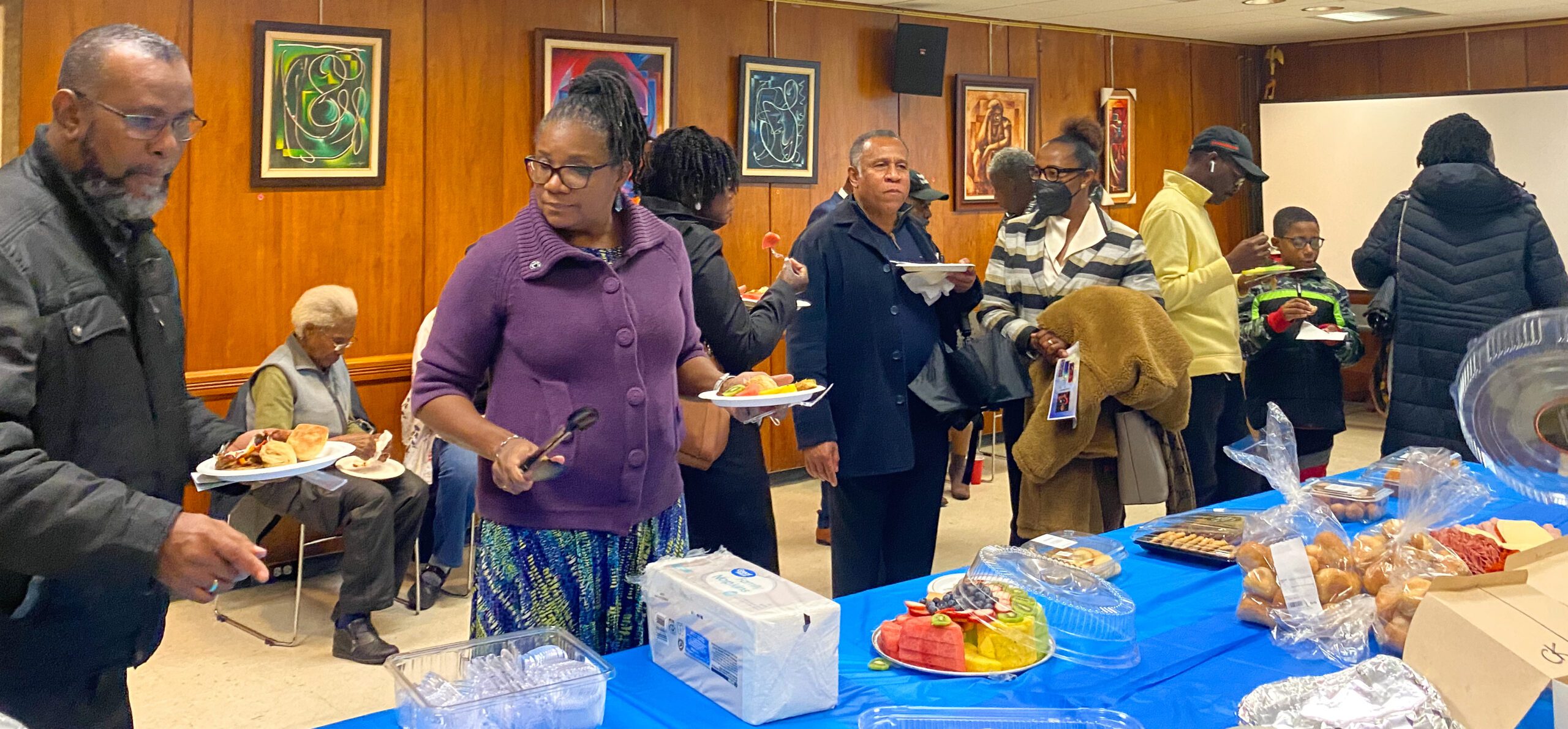
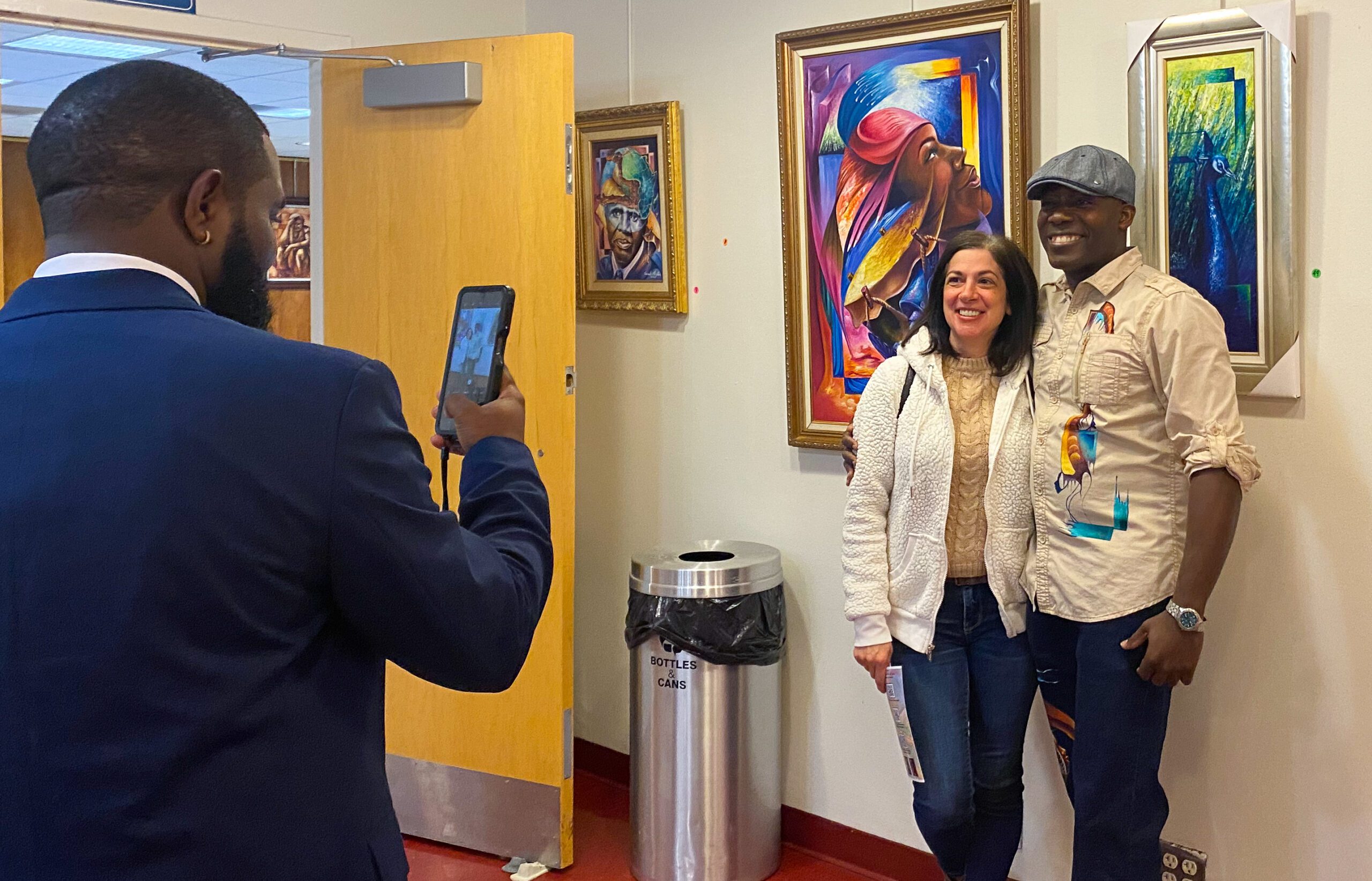
Before the pandemic, the library’s artist shows were held once per month, with a new artist each time. Mezilas is the second artist since the library has restarted the program.
“It’s good for the community that we can come to the library and have something like this,” said Uniondale resident Jacquelyne Constantine, who is not Haitian, but still related strongly with Mezilas’ work. “To me, I’m seeing my culture. I love these colors, and I love the features of a person that he brings out.”
This was not Constantine’s first time meeting with Mezilas, as she recently commissioned the artist to paint a portrait of her daughter after hearing about his work from her local hair stylist.
Mezilas has made his work known in the community by participating in multiple art shows, including a 2016 exhibit with Hofstra University’s Museum of Art, as part of its Haitian Americans on Long Island Collection. He spends his free time teaching online painting, drawing and pottery courses.
The artist also currently works with ACLD, a nonprofit Long Island agency that provides opportunities for individuals with autism and learning and developmental disabilities. Mezilas teaches painting courses for children and adults in this program.
“Even if he’s living in America, he still keeps his culture,” said Florestal Evens, an artist and resident of Brooklyn. He met Mezilas during their studies together at the Ecole Nationale des Arts (ENARTS), or National School of the Arts, in Haiti. “Most of the time, when people think about Haiti, they only see violence, they only see the misery. From this exhibition, he represents the good part of Haiti.”
Mostly composed of acrylic paintings, Mezilas’ artwork displays symbols that represent his culture, such as the common themes of instruments being played, people dancing and food being prepared. In several of his pieces, Mezilas incorporates a three-dimensional clay mask that pops out from the background. These masks highlight Haitian religion and Voodoo.
“Most people who don’t know Haiti, or most Haitians who don’t know the culture. They usually ask me questions about what Haiti looks like and what food do we eat. That’s why, in these paintings, I represent all of our identity in it, like religion or like Voodoo,” Mezilas said. “To make people ask questions about what that is, and then they can do some more research on their own on something they didn’t know before and now they can learn from it.”
“Even if he’s living in America, he still keeps his culture.”
Florestal Evens, Brooklyn artist
Mezilas’ “Haitian Resilience Project” was shared in the Uniondale Facebook group, and members expressed their joy in seeing the culture being represented in the community. “We are definitely having our footprints though out the town,” one group member commented.
Libraries “are a hub for the community. They should be a go to place because you can get current events as well as historical events in a library,” said Veta Bisserup, a Roosevelt resident who came with her father on behalf of the Long Island Black Artist Association.
The library plans to hold more events to educate about Haitian culture, including a bigger celebration that is annually held in May for Haitian Heritage Month.
